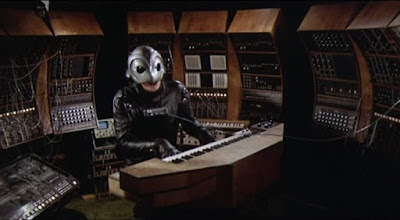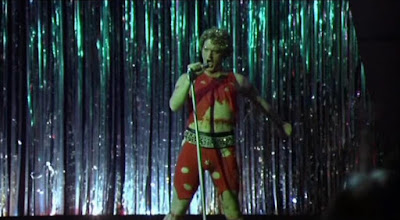(1974) Written and directed by Brian De Palma; Starring: Paul
Williams, William Finley, Jessica
Harper and Gerrit Graham; Available on Blu-ray and DVD
Rating: ****
“I got the idea riding in an elevator, and listening to a
Beatles song done on Muzak, and I said to myself, ‘They take this beautiful,
original creation and reduce it to elevator music.’’ – Brian De Palma
Writer/director Brian De Palma’s tragicomic film Phantom of the Paradise is a Faustian
tale about the music industry that’s just as timely now as when it was released
in 1974 (minus the platform shoes, polyester shirts and glitter). It’s only fitting
that the voiceover introduction is by none other than Rod Serling, who was no
stranger to Faustian tropes in his Twilight
Zone and Night Gallery shows. De
Palma’s music business satire also blends equal parts of The Phantom of the Opera into the mix.
Paul Williams stars as the enigmatic record mogul Swan* who
made a deal with the devil to remain eternally young, and takes equal pleasure
in building and destroying music careers. Despite being short of stature, he
intimidates all who cross his path, channeling Napoleon with a dash of Charles
Foster Kane (Xanadu becomes Swanage). He’s built an empire** on the backs of
talented performers, usurping their talents to his own end. In an industry that
routinely chews people up and spits them out, Swan is an apex predator. Williams was once considered for the part of unfortunate composer
Winslow Leach, but preferred to play the amoral Swan. In addition to starring,
Williams wrote the film’s infectious songs, which range from deliberately
cheesy to quite good. In an interview, Williams commented that Phantom of the
Paradise afforded him the opportunity to parody the music he enjoyed from
different eras.
* De Palma noted that he modeled Swan after legendary
megalomaniac producer Phil Spector.
** Swan’s record company label, which appears in several
scenes, was originally called “Swan Song,” but was changed to “Death Records” after
a lawsuit from Led Zeppelin’s label, which laid claim to the former title. As a
result, scenes had to be re-shot, or references to Swan Song were hastily
covered up with traveling mattes.
William Finley plays Winslow Leach, a talented, but naïve
composer who writes a massive cantata based on Faust, and finds his muse in a
young singer named Phoenix (Jessica Harper). When Swan appropriates the
composition for his own nefarious purposes, he ensures that Leach is out of the
picture. Leach is framed for selling heroin, and sentenced to life in Sing Sing
prison, where he labors on an assembly line manufacturing Tiddlywinks. He
manages to escape, and sets out to destroy Swan’s record plant. His plans are
thwarted when his head gets caught in a record press, leaving half of his face
deformed, and his voice destroyed. Leach proceeds to take up residence in the
Paradise as the Phantom, vowing to prevent anyone other than Phoenix from performing
his music. Sporting chrome teeth and clad in black leather with a silver
helmet, he’s the ideal anti-hero for the glam rock age. Swan proffers an uneasy
truce by drafting a contract, signed in the Phantom’s blood (Perhaps Swan is
the only person who could get blood from a Leach? Sorry, that was too easy). In
one memorable scene, Swan reconstructs Leach’s damaged voice in his recording
studio, using electronic wizardry (the “new” voice is Williams, himself). The scene
rings true today, with modern producers utilizing all manners of electronic trickery,
such as Auto-Tune, to convert the proverbial sow’s ear into a silk purse.
Harper, in her first feature film role (Linda Ronstadt was
also considered), does a credible job as the Phantom’s muse, Phoenix. She
proves her singing is up to task for Swan, but it’s clear the shifty record
producer has other plans for her. As her character is portrayed in the film, Phoenix
is a bit of a contradiction. As one early scene proves, she’s strong-willed and
ambitious, but refuses to be part of Swan’s harem. When she finally gets Swan’s
personal attention, however, she’s more than willing to offer him anything in
return for fame.
One of the dominant themes in Phantom of the Paradise is the ephemeral nature of popular music,
with the “here today, gone tomorrow” quality of many performers. Gerrit Graham
is excellent as Swan’s latest flavor of the month, the flamboyant rock idol Beef.
He commands our attention with his display of prima donna prissiness,
contrasted with a rock ‘n roll swagger. When he finds out Leach’s composition
was “written for a chick,” he’s tasked with making the music his own.
Naturally, his embellishments don’t sit well with the composer.
De Palma tells his rock ‘n roll parable with great
confidence and flair. The film exudes a comic book feel, told in broad strokes,
with imaginative sets,* garish colors and bizarre costumes. In one effective
scene, presented in split screen, the Phantom plants a bomb in an onstage prop
car, bringing an abrupt end to an (intentionally) execrable pop ditty. De Palma
deliberately borrows a page from Hitchcock in a Psycho-inspired scene where the Phantom threatens Beef in the
shower. De Palma originally intended to hire a name band, but ended up
assembling his own group, consisting of Archie Hahn, Jeffrey Comanor and Peter
Elbling. The trio appears as three distinct groups, representing‘50s doo-wop
(The Juicy Fruits), ‘60s surf (The Beach Bums), and ‘70s glam rock (The
Undeads). Their theatricality represents a shift in the music industry, where stage
presence is arguably more important than the music. The performance of The
Undeads will no doubt invite comparison to performers such as Kiss and Alice
Cooper, and leave one to ponder if fiction preceded fact, or vice versa. Was it
the chicken or the egg that came first? I’ll leave it to music historians to
decide who influenced whom.
* Fun fact: before playing the title role in De Palma’s
adaptation of Carrie, Sissy Spacek
served as set dresser for this film.
With its dark themes
and sardonic sense of humor, Phantom of
the Paradise never quite connected with movie-goers at the time, but it’s
since gained a well-deserved status as a cult classic (Guillermo del Toro is
among its many admirers). The film has often been compared to The Rocky Horror Picture Show, which it
pre-dated by a year, but the former title was relegated to obscurity, while the
latter film gradually found success with audiences. This seems unfair, because
the similarities are largely superficial, and Phantom of the Paradise eclipses the 1975 film in many regards.
Maybe it’s a matter of personal taste, but I find this film more watchable on
its own, whereas The Rocky Horror Picture
Show relies on the experience that surrounds the film. Phantom of the Paradise is the epitome of a classic cult film:
something too outré for the masses to appreciate, but too precious for film
buffs to ignore.









I loved this flick and even though I had issues with choices certain characters made. It was still a lot of fun. I agree I liked this more.
ReplyDeleteWasn't a fan of Rocky Horror
Thanks for stopping by, Vern! De Palma was running on all cylinders with this one.
DeleteGlad I caught this great review of phantom of the paradise, Barry!
ReplyDeleteI think I agree with you about this film and The Rocky horror picture show. I'm probably more likely to pop in phantom of the paradise and definitely more likely to suddenly start randomly singing one of its awesome songs!!
Thank you, sir! I wonder if there's an alternate timeline where Phantom of the Paradise has played multiple midnight screenings to millions of adoring fans? ;)
Delete